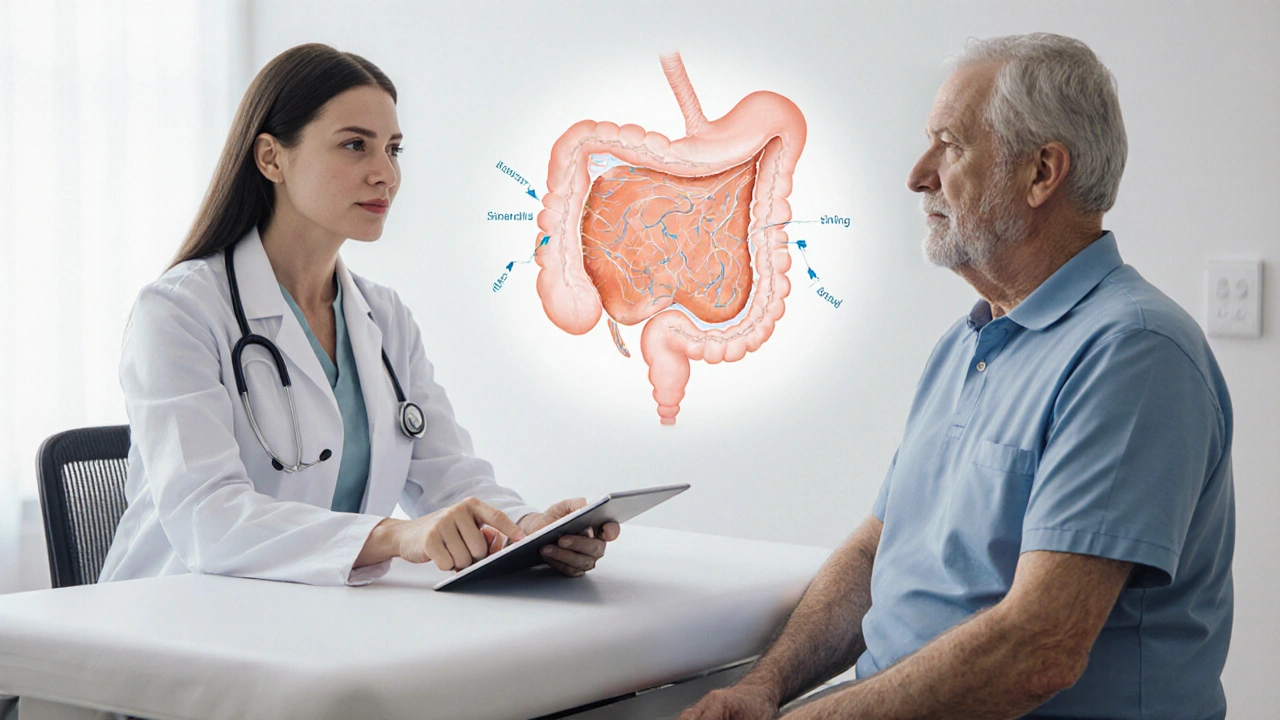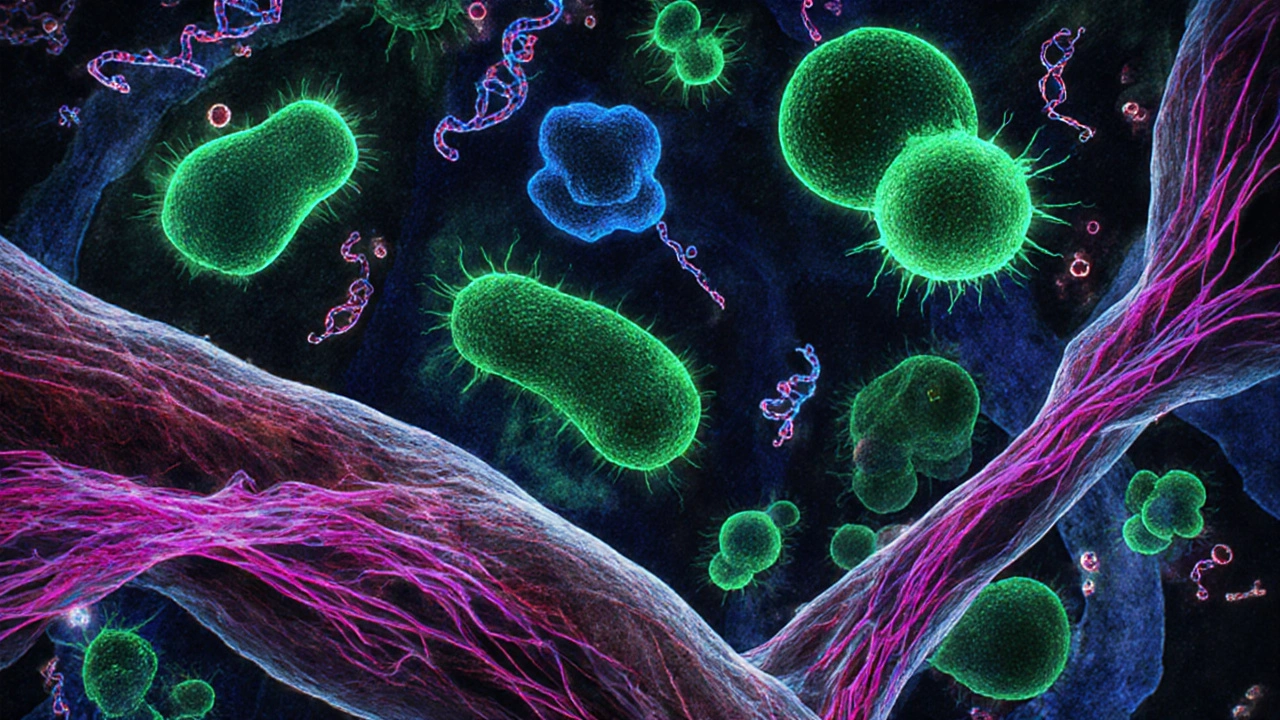When we talk about Skeletal Muscle Conditions is a group of disorders that affect the structure or function of the body's striated muscles, ranging from inherited diseases like muscular dystrophy to age‑related loss of mass called sarcopenia. These conditions don’t stay confined to the limbs; they send signals that ripple through the entire body, especially the digestive system.
Why the gut and the muscles are in constant conversation
It might sound surprising, but the muscle gut connection works both ways. Muscles release signaling proteins called Myokines that travel through the bloodstream and can tighten or loosen the intestinal barrier, change gut motility, and even reshape the composition of the Gut microbiome the community of trillions of bacteria, fungi, and viruses living in the digestive tract. At the same time, a disturbed microbiome pumps out harmful metabolites that trigger systemic Inflammation the body’s immune response that, when chronic, damages tissues throughout the body. This two‑way street explains why many patients with muscle wasting notice bloating, irregular bowel movements, or even nutrient malabsorption.
Muscle disorders that most often show up with gut symptoms
| Condition | Typical GI Signs | Underlying Mechanism |
|---|---|---|
| Muscular dystrophy | Constipation, gastro‑esophageal reflux | Reduced mobility limits gut motility; chronic inflammation raises cytokine levels |
| Inflammatory myositis | Diarrhea, abdominal pain | Auto‑immune attack releases Cytokines that increase intestinal permeability |
| Cachexia (cancer‑related muscle loss) | Loss of appetite, early satiety | Tumor‑derived factors disrupt the Enteric nervous system the network of neurons that controls digestion |
| Sarcopenia | Slow gastric emptying, bloating | Age‑related decline in Myokines reduces anti‑inflammatory signaling in the gut |
Biological pathways that link muscle health to the gut
Three major routes carry messages between muscle and intestine:
- Inflammatory pathways: Damaged muscle fibers release Cytokines such as IL‑6 and TNF‑α, which travel to the gut and activate immune cells that loosen tight junctions, making the gut more “leaky.”
- Hormonal cross‑talk: Myokines like irisin and myostatin act like hormones. Irregular levels can either stimulate or suppress gut motility, while myostatin may encourage fibrotic changes in the intestinal wall.
- Neurological signaling: The Enteric nervous system communicates with the central nervous system via the vagus nerve. Muscle pain or fatigue can alter vagal tone, which in turn modifies secretion of digestive enzymes.

What you can do: Lifestyle tweaks that support both muscle and gut
Even if a doctor prescribes medication, everyday choices can tip the balance toward health.
- Resistance training strength‑building exercises that stimulate muscle fibers boosts myokine production, which helps seal the gut barrier.
- Adding Omega‑3 fatty acids polyunsaturated fats found in fish oil that reduce systemic inflammation can lower cytokine storms and improve bowel regularity.
- Regular consumption of Probiotics such as Lactobacillus and Bifidobacterium replenishes beneficial bacteria, directly countering the leaky‑gut effect of chronic inflammation.
- Fiber‑rich foods (whole grains, legumes, fruits) feed the gut microbes, producing short‑chain fatty acids that reinforce the intestinal lining.
- Staying hydrated and timing meals around workouts (e.g., a small carbohydrate snack 30minutes before resistance training) supports optimal digestion and nutrient absorption.
Clinical clues and screening recommendations
Physicians should ask patients with muscle weakness about:
- Changes in stool frequency or consistency
- Unexplained abdominal bloating or pain
- Loss of appetite or early satiety
Basic labs (CRP for inflammation, serum albumin for nutrition) combined with a stool calprotectin test can reveal hidden gut inflammation. If red flags appear-persistent diarrhea, weight loss, or blood in stool-refer to a gastroenterologist for endoscopy or imaging.
Future directions: Research on the muscle‑gut axis
Scientists are now trialing Fecal microbiota transplantation (FMT) in patients with severe myositis, hoping that a healthier microbial community will dampen muscle inflammation. Parallel studies are testing myokine‑mimicking drugs that could boost gut barrier function without the need for strenuous exercise, a promising avenue for bedridden patients.

Frequently Asked Questions
Can poor gut health cause muscle weakness?
Yes. An unhealthy gut can increase systemic inflammation, reduce nutrient absorption, and impair insulin signaling-all of which drain muscle strength over time.
Are there specific myokines that protect the gut?
Irisin and IL‑15 are two myokines shown to tighten intestinal tight‑junction proteins and lower permeability in animal models.
What diet changes help both sarcopenia and digestive issues?
Focus on high‑quality protein (lean meat, legumes), plenty of fiber, and omega‑3 rich foods. Adding fermented items like yogurt or kefir supplies probiotics that support gut lining.
Is resistance training safe for someone with chronic diarrhea?
Generally yes, but start with low‑impact, short sessions and stay hydrated. If symptoms worsen, consult a gastroenterologist before increasing intensity.
Do supplements like vitamin D affect the muscle‑gut link?
Vitamin D modulates immune responses and can improve gut barrier integrity, while also supporting muscle protein synthesis, making it a useful adjunct.

Cynthia Boen
September 30, 2025 AT 20:29This whole muscle-gut thing is just another way for big pharma to sell more supplements. I’ve got sarcopenia and I eat junk food and I’m fine. Stop overcomplicating it.
Amanda Meyer
October 1, 2025 AT 09:00While the science here is compelling, I’m concerned about the oversimplification of complex physiological pathways. The gut-muscle axis is real, but reducing it to a few myokines and probiotics risks creating false hope. Clinical evidence remains limited outside of controlled trials. We need more longitudinal studies before making broad lifestyle recommendations.
Jesús Vásquez pino
October 2, 2025 AT 14:26Whoa hold up-so my chronic bloating isn’t just from eating too much pizza? I’ve been blaming my diet for years but never thought my weak arms could be the real culprit. This makes sense. I’ve been lifting weights again and my digestion improved. Coincidence? I don’t think so.
hannah mitchell
October 4, 2025 AT 12:01Interesting read. I’ve noticed my mom’s constipation got worse after her muscle loss diagnosis. Never connected the dots until now.
vikas kumar
October 4, 2025 AT 23:50As someone from India where protein intake is often low and gut issues are common, this is super relevant. Many elders here suffer silently-no one tells them that fixing their gut might help them stand up easier. Simple advice like eating dal with rice and yogurt? It’s science and tradition together.
Vanessa Carpenter
October 5, 2025 AT 07:52I’ve been doing resistance training for six months and my IBS symptoms have calmed down. Not cured, but better. I think this connection is real and under-discussed. Keep sharing this kind of stuff.
Bea Rose
October 5, 2025 AT 11:22Myokines don’t fix bad habits. Stop pretending exercise is a magic pill for leaky gut.
Michael Collier
October 7, 2025 AT 02:17The mechanistic clarity presented in this article is exemplary. The integration of inflammatory, hormonal, and neurological pathways into a coherent framework represents a significant advancement in translational medicine. I commend the author for synthesizing current literature with clinical pragmatism.
Shannon Amos
October 8, 2025 AT 08:23So let me get this straight… if I lift weights, my poop gets better? And I thought yoga was just for stretching my hamstrings. 😏
stephen riyo
October 10, 2025 AT 05:44Wait, wait, wait-I read this whole thing and now I’m supposed to believe that my weak legs are causing my acid reflux? And that I need to eat fiber and omega-3s and probiotics and time my snacks around workouts? I’m just trying to get through the day, not run a biochemistry lab!
Wendy Edwards
October 10, 2025 AT 17:37I’ve been dealing with sarcopenia since my 60s and my stomach’s been a mess for years. I started eating more yogurt and doing light weights with resistance bands and honestly? My bloating’s way better. I don’t know all the science words but I know how I feel. Keep it real, this post helped.
Jaspreet Kaur
October 12, 2025 AT 07:43If muscles are talking to the gut then what is the gut saying back? Is it screaming? Whispering? Begging for fiber? We think we control our bodies but maybe they’ve been whispering secrets all along and we just stopped listening
Gina Banh
October 12, 2025 AT 15:47Irregular bowel movements in sarcopenia? That’s not just ‘getting older’-that’s systemic inflammation. Stop dismissing it. Get a calprotectin test. If you’re over 60 and sluggish in the gut, it’s not normal. Do something.
Deirdre Wilson
October 14, 2025 AT 07:35So my muscles are like little messengers sending secret notes to my intestines? That’s wild. Like a tiny muscle postal service. I’m gonna start calling my hamstrings ‘Gut Dispatch’ from now on.
Damon Stangherlin
October 14, 2025 AT 09:45I’ve been taking vitamin D and omega-3s for my joints, but I didn’t realize they were helping my digestion too. This makes me feel better about sticking with it. Thanks for the clarity!
Ryan C
October 14, 2025 AT 11:42Actually, the paper you’re referencing from 2022 didn’t account for confounding variables like NSAID use or antibiotic history. Also, FMT trials are phase 1. Don’t get excited. And no, yogurt doesn’t ‘replenish’ bacteria-it’s a probiotic, not a magic bullet. 🧬
Dan Rua
October 14, 2025 AT 13:31This is awesome. I’ve been telling my grandma to do light squats and eat kefir for months. She thought I was nuts. Now I’ve got science on my side. 😊
Mqondisi Gumede
October 16, 2025 AT 08:11Why is this even a thing? In my country we just eat meat and work hard. No probiotics no omega-3s no fancy science. We don’t get bloated because we don’t sit around thinking about our guts. This is overeducated nonsense